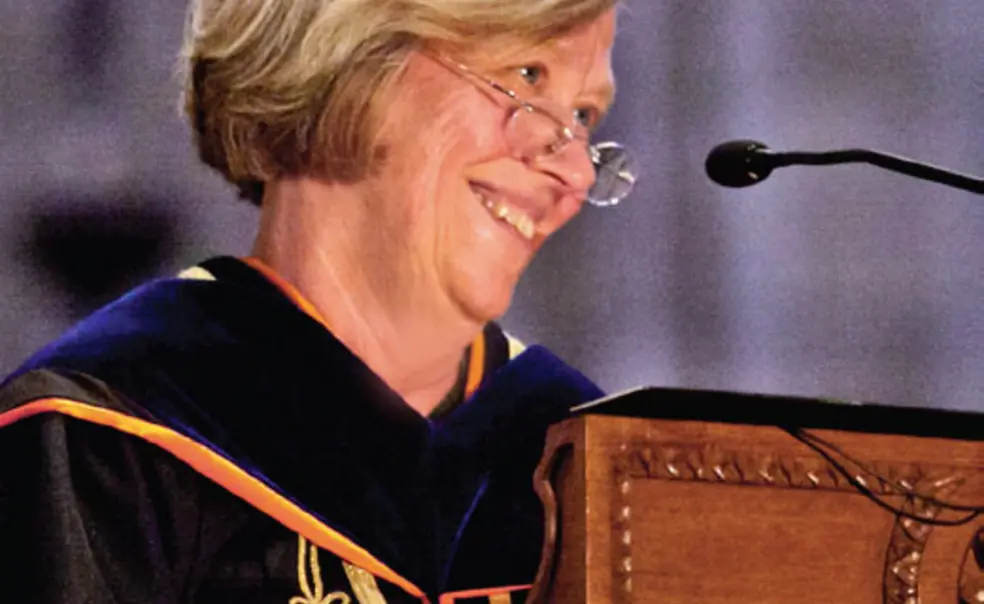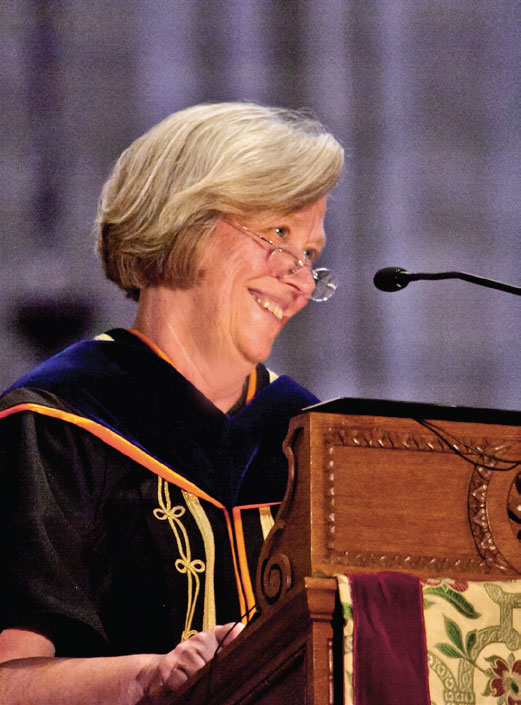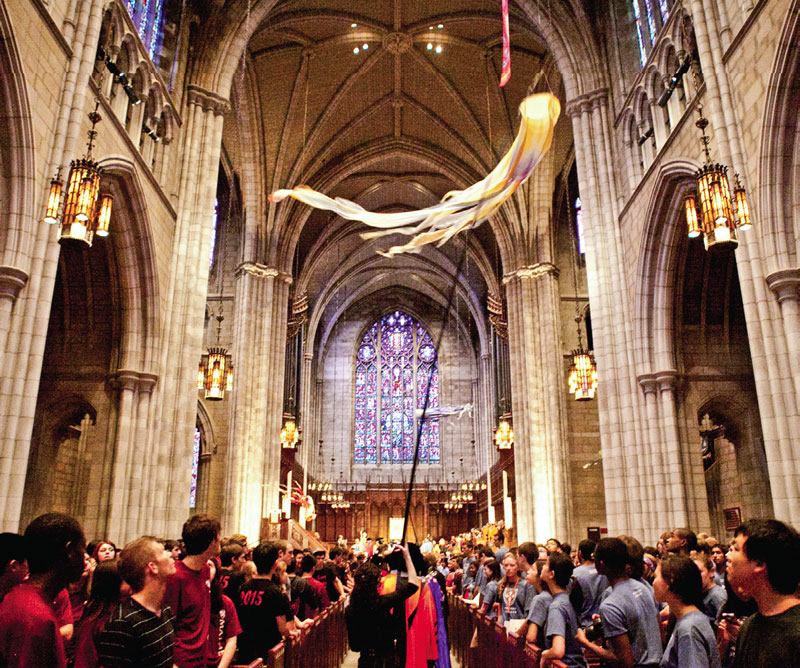Opening Exercises: Thriving in the Information Age
The Alumni Weekly provides these pages to the president
On September 11, following a Gathering in Remembrance of the terrorist attacks of September 11, 2001, on Cannon Green, we formally marked the beginning of the new academic year with Opening Exercises in the Princeton University Chapel. In my address, I reflected on what it means to acquire knowledge in the information age; on the importance of distinguishing between the wealth of facts now at our fingertips and the multidisciplinary tools and qualities of mind required to interpret them. Here is what I said.—S.M.T.
At the beginning of each new academic year, I arrive at Opening Exercises with a sense of both optimism and yearning. The optimism is based on what I know about each of you—the promise that Dean Rapelye and Dean Russel and their colleagues saw in the information you shared with us in your admission applications. You have been chosen because we believe that each of you has both the quality of mind and the strength of character to extract from this privileged place all that it is capable of providing, and to use your education to make a positive difference in this world. You are the source of my optimism. The familiar admonition in the Book of Luke, “to whom much is given, much is expected,” applies in full measure to all Princetonians, and I hope you will take it very seriously.
My yearning grows out of pure envy of the intellectual journey upon which you are about to embark. As you execute this last great leap between adolescence and adulthood, each of you will make decisions that will determine the kind of person you will be for the rest of your life. You will encounter ideas both ancient and modern that will astonish and motivate you, and you will discover that you have the capacity to generate new ideas yourself. You will make friends that will be with you for the rest of your days, and those friends, coupled with a well-honed loyalty and devotion to this place, will draw you back time and again to the Princeton campus long after graduation. The next four years will be heady, stressful, thrilling, exhausting, happy, and ultimately deeply rewarding.
You are undertaking your intellectual journey in a profoundly different milieu from the one I encountered as a freshman over 40 years ago, a time that my son refers to as the late Jurassic age. Then information was at a premium; it had to be laboriously extracted from the catacombs of libraries and archives, retrieved from vast card catalogs, and uncovered in heavy tomes, almanacs, manuscripts, encyclopedias, and dictionaries. Today information is more often than not just the click of a mouse or the tap on a screen away. In the space of your short lifetimes, information has migrated from the library to the desktop to the backpack, and increasingly to the pocket. There is the potential for all the world’s information to be at your fingertips all the time.
The magnitude of this information revolution is matched only by the development of the printing press in the 15th century, a seismic advance in technology that has some elements in common with the rise of the Internet today. Like that historic event, the spirit of the modern revolution is highly democratic, in that it is making information accessible to anyone with an Internet connection. No longer is information the purview of those who have access to the world’s great seats of learning; it is potentially available to every man, woman, and child on the planet with no strings— or wires—attached. And like the arrival of the printing press, the instant availability of information—from Plato’s theory of justice to Lady Gaga’s middle name (by the way, she has two—I looked them up!)—has the potential to accelerate the creation of new ideas and the discovery of new knowledge and ultimately to lead to greater insight into the nature of the human condition and the natural world. Yet realizing this revolutionary potential will take far more than the ability to access the world’s information. It will require the ability to organize that information so that patterns can be discerned within it; to recognize unexpected connections between disparate bodies of knowledge; to apply the tools of logic and moral reasoning in order to extract true understanding; and to muster the courage to draw conclusions and then change your mind when new facts come to light. Without a well-prepared human mind, the abundance of information at our disposal will remain a cacophony rather than a symphony. In the next few years, your Princeton education will prepare you to be the orchestra conductors of all the world’s information.
There are those who are much less sanguine than I that the information age represents a unique opportunity for forward progress. In a recent article in The New York Times, Neal Gabler of the Annenberg Norman Lear Center at the University of Southern California lamented that the facility of accessing information on the Internet has led us into the post-idea era, where, and I quote: “We are inundated with so much information that we wouldn’t have time to process it even if we wanted to, and most of us don’t want to. ... In effect, we are living within the nimbus of an informational Gresham’s law in which trivial information pushes out significant information, but it is also an ideational Gresham’s law in which information, trivial or not, pushes out ideas.”
Now dire predictions about technological innovations that empower citizens by making information more accessible are as old as time itself. Socrates worried that the invention of writing would erode the ability to retain memories. The advent of the printing press led a Swiss scientist, Conrad Gessner, to warn in 1565 that the book would overwhelm people and be confusing and harmful to the mind. My own personal favorite, however, is an 1883 article in a New York medical journal that predicted that public education would “exhaust the children’s brains and nervous systems with complex and multiple studies, and ruin their bodies by protracted imprisonment.”
While I don’t subscribe to the view that information per se is dangerous to either the individual or to society, I am concerned that the ready availability of so much information is creating the illusion that we know more than we do, and is confusing facts with ideas and interpretation. The inadequacy of facts alone was made patently clear to me over the summer as the United States Congress debated whether to raise the debt ceiling. The debate began with a number of facts that were not in dispute—the size of the national deficit; the cost to taxpayers of servicing the interest on America’s debt each year; the fraction of the federal budget that is available for discretionary spending versus entitlements, to name a few. Yet the debate was guided not by those facts but rather by very different philosophical positions regarding the appropriate role of government. On one side of the aisle were individuals who fervently believe that government should play a minimal role in the lives of citizens; that government taxation and spending should therefore be reduced; and that markets should be allowed to function without government interference. Arguing from that set of assumptions, they voted against raising the debt ceiling, as a means to constrain the role of government. Those on the other side of the debate share a conviction that government can and should be a force for good in the lives of citizens; that it has a responsibility to protect the least fortunate among us; and that in a recession the government should inject money into the economy to promote employment and stimulate growth. From that philosophical perch, raising the debt ceiling was a foregone conclusion.
How is it that armed with the same basic facts, members of Congress came to such diametrically opposite conclusions? One reason is that human affairs are messy, as the wise South African Archbishop Desmond Tutu has pointed out, and do not lend themselves to simple black-and-white solutions. Another answer is that each of those members brought to the question different experiences and beliefs that informed his or her world view, and different levels of understanding of what was at stake.
In an ideal society, if such a thing were possible, engaged citizens would collectively reach important decisions in good faith by taking into consideration ideas from political theory, a discipline that lies between political science and philosophy and that for millennia has been contemplating the purpose of government. They would look to history for lessons learned and to moral philosophy to articulate the ethical dimensions of the question. Teachings from economics, sociology, and psychology would help leaders anticipate the impact of various outcomes on both the social fabric as a whole and the individual members of society. Yet even in this ideal society, it is highly likely that there would be no single accord reached because of the great variety of human experience and the tremendous plasticity of the human mind. We do not all see the world the same way, but it is incumbent on each of us to approach challenging issues that affect us all with as many intellectual tools—in addition to raw information—as we can assemble. As Woodrow Wilson put it more than a century ago, “There is no profit in information unless you know what to do with it, unless your mind has a certain scope and mastery.”
Over the next four years, your Princeton education will stretch your minds in ways that you can only begin to imagine now, preparing you to be informed and effective citizens of this and all other countries—citizens who are able to draw understanding from and discern the most fruitful path amid the immense sea of facts surrounding them. You will learn multiple ways to approach a problem, applying historical and social analysis, quantitative and scientific reasoning, and moral philosophy to unpeel the thick onion skins of difficult conundrums. You will hone your own aesthetic sensibility through the study of great works of art, and through art, develop a deeper understanding of the human condition. You will experience the power of language to serve as the entrée into another culture, and I hope you will take advantage of the many opportunities that Princeton provides you to take that new facility abroad. In courses in epistemology, you will have an opportunity to consider the nature and boundaries of knowledge itself—to distinguish facts from knowledge and truth. If you learn these lessons well, not only will you thrive in the information age, you will also be a credit to your country and to your alma mater, like so many Princetonians before you.
I am looking forward to getting to know each of you and to cheering you on inside and outside the classroom as you chart your course through this great University. I hope you will leave our campus, saying, as generations of students have said before you, “This place changed my life.” Welcome to Princeton!















No responses yet